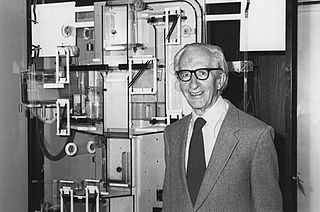A Quote by John Kenneth Galbraith
Mr. David Stockman has said that supply-side economics was merely a cover for the trickle-down approach to economic policy — what an older and less elegant generation called the horse-and-sparrow theory: If you feed the horse enough oats, some will pass through to the road for the sparrows.
Related Quotes
We gallop through our lives like circus performers balancing on two speeding side-by-side horses--one foot is on the horse called "fate," the other on the horse called "free will." And the question you have to ask every day is--which horse is which? Which horse do I need to stop worrying about because it's not under my control, and which do I need to steer with concentrated effort?
[Donald] Trump and all the Republicans believe in the theory of trickle down economics which is a theory discredited even by the author himself David Stockton. The theory suggests that if we take care of the people at the top, if we cut taxes for the wealthy, if we make sure they are doing really well, then the investments that they make in the economy and the jobs that will create, will make everything grow and it will have a trickle down effect on the rest of us.
The trickle-down theory of economics has it that it's good for rich people to get even richer because some of their wealth will trickle own, through their no doubt lavish spending, upon those who stand below them on the economic ladder. Notice that the metaphor is not that of a gushing waterfall but of a leaking tap: even the most optimistic endorsers of this concept do not picture very much real flow, as their language reveals" pg. 102.
My horse needs to be quiet enough not to draw my attention. You want your horse always aware of you. Be aware of your horse! Fidgeting? Direct that! Think of it as a gift. Do something with that energy; redirect it or it will be a negative. Don't let your horse check-out. A horse wants peace. Trade movement for peace.
He’s sort of a homeless horse,” I said. “I’m leaving for the airport in two seconds, and I won’t be back for a couple days. You can put the horse in the garage, but I don’t want that horse in my apartment.” “Who would put a horse in an apartment? That’s dumb.” “Where’s the horse staying now?” “My apartment.” “I can always count on you to brighten my day,” Ranger said. And he disconnected.
There is a story in Zen circles about a man and a horse. The horse is galloping quickly, and it appears that the man on the horse is going somewhere important. Another man standing alongside the road, shouts, «Where are you going?» and the first man replies, «I don't know! Ask the horse!» This is also our story. We are riding a horse, and we don't know where we are going and we can't stop. The horse is our habit energy pulling us along, and we are powerless.
Economics, over the years, has become more and more abstract and divorced from events in the real world. Economists, by and large, do not study the workings of the actual economic system. They theorize about it. As Ely Devons, an English economist, once said in a meeting: 'If economists wanted to study the horse, they wouldn't go around and look at horses. They'd sit in their studies and say to themselves, `What would I do if I were a horse?' '
Now it is unambiguously clear that trickle-down economics does not work. But what does that mean? That means we have to structure our economic policies to make sure that we have shared prosperity. And you don't do that by giving a tax cut to the big winners and raising taxes on those who have not done very well. Your economic policy has to respond to the way our economic system has been working.



































